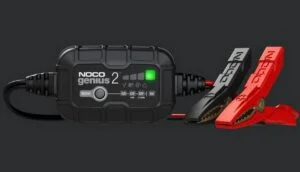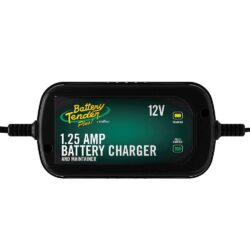Conveniently, a car’s battery charges while the vehicle is in use. However, on most traditional vehicles, there is not a gauge that displays battery capacity. For this reason, many people are left wondering, “How long does it take to charge a car battery while driving?”
Of course, there are different ways to charge the battery of a car as well. In this article, we are going to explore the various rates of vehicular battery charging. We will detail the amount of time it takes to charge a car battery through the most popular methods.
How Long Does It Take To Charge a 12 Volt Car Battery?
It is difficult to say exactly how long it takes to charge a 12 Volt Car Battery. There are a large number of factors that influence how long it would take to charge an individual battery. Most notably, variables include:
- The Amount of Electrical Current (Amps)
- The Capacity of the Battery
- The Starting Discharge Level of the Battery
- The Temperature of the Battery
To make it easy, we are going to look at approximate charging times for standard 12-volt car batteries. Below, there are some estimates for fully charging an empty battery at average temperatures.
How long to charge a car battery at 40 amps?
At 40 Amps, a car’s battery will fully recharge in an hour or less. In fact, a 40 amp charger can power a car’s battery to starting capacity in as little as a few minutes.
40 amps is an extremely powerful charging rate. For this reason, 40 amp car battery chargers are popular for their speed and efficiency.
However, users should be careful not to overcharge their car’s battery at a rate of 40 amps. Overcharging a car battery can lead to permanent damage, which may create the need for replacement.
How long to charge a car battery at 4 amps?
It takes approximately 12 hours for a car battery to charge at a rate of 4 Amps. 4 Amp battery chargers are often used overnight because of their long charge times. 4 amps of current is great for slowly charging a battery until it becomes full.
With a smart charger, you can program it to shut off automatically before causing any damage to the system. Likewise, the charger will kick back on if the capacity dips below a certain level.
Although it is not great for quick starts, 4 amp charging works well for normal battery use. Additionally, 4 amp charging is popular for smaller capacities in dirt bikes, golf carts, or other small vehicles.
How long to charge a car battery at 2 amps?
2A is one of the lowest popular rates for charging car batteries. With that said, it takes about 24 hours for a car’s battery to charge to full capacity.
Much like at a rate of 4 amps, 2A is generally too slow for jump-starting a car. Instead, a low level of current, such as 2 amps, is excellent for maintaining normal battery levels during regular use. Additionally, limited-use cars are commonly charged with 2 amp chargers.
How Long Does It Take To Charge a Car Battery While Driving?
When a car’s battery fails, it needs to be brought up to enough capacity to restart. Once it is running, the battery will begin to recharge itself. This is by design, as a minimum capacity is then required to restart for its next use.
Recharging your battery by alternator while driving
While your engine is running, the alternator recharges your car’s battery. In order to do so, the engine must be going faster than roughly 1,000 RPM. Because of this, the time it takes to charge the battery depends on your driving.
On an open freeway, a car battery will recharge in as little as 30 minutes. This can happen because the engine is continuously running. In a city, your driving may be more prone to many starts and stops. Therefore, it may take an hour or more to recharge your car’s battery fully.
Charging a drained car battery after a long time of non-use
Your battery may be empty if your car has not been used for a long time. A fully discharged battery can be jump-started or plugged into a charger.
If you’re using your car for the first time in a while, it is advised to let it idle. Otherwise, a 30-minute drive will yield the same results. Either way, limiting electricity use such as lights, air conditioning, and radio will help speed up the process.
How Long Does it Take to Trickle Charge a Car Battery
A “trickle charger” is a device that charges your car’s battery slowly for an extended period of time. It is designed to provide a long, slow, and sustainable source of electricity. Some trickle chargers must be disconnected when the battery is full, while others can remain.
Trickle charging is popular among people who only use their cars occasionally. If a car is only driven for a few hours, the alternator has limited time to recharge the battery. In order to fully charge the battery, plugging it into a trickle charger will ensure it reaches capacity.
In general, trickle chargers are not used for their speed. Instead, trickle chargers keep car batteries ready while the car is in storage. That way, an idle vehicle will always be able to be started and driven.
Additionally, keeping a battery charged will extend its life. In comparison to an empty battery, a fully charged battery is much less likely to form sulfide.
Find purchasing options for Smart Trickle Charger here:

Noco Genius2 Charger

Battery Tender Plus Charger
Estimated time to charge a car battery with trickle charging
Trickle chargers generally operate at levels between 1 and 2 amps. For this reason, it could take anywhere between 24 and 48 hours for an empty battery to trickle charge fully.
Benefits of trickle charging a car battery
Although the charging speed is generally very slow, there are many benefits of using a trickle charger. To name a few, trickle charging:
- Eliminates the need for a separate charger and maintainer
- Lowers the chances of damage from overcharging
- Maximizes the lifespan of your car’s battery
- Is extremely easy to set up and use
Conclusion
In conclusion, there are many different ways to charge your car’s battery. Whereas it is possible to charge your car’s battery, there are also alternatives. Your car’s alternator may not be used enough to maintain optimal battery levels.
Although it is tough to give exact numbers, we hope that these estimates were very helpful. It is essential to choose the right charging method to eliminate possible battery damage.
40 amp charging is fast and efficient, but low amperage levels can maintain battery health. Below, we have included some additional frequently asked questions that pertain to charging a car battery.
FAQs
Can a completely dead battery be recharged?
Yes. A completely dead battery can be recharged in a few different ways. After a jump start, a running car will recharge its battery with the alternator. The formerly dead battery will recharge simply by driving around (or idling).
Additionally, you can plug in a completely dead battery to a charger. Depending on the amperage level, it will fully recharge from anywhere between 1 and 48 hours.
However, it is important to note that a completely dead battery may be at the end of its life. To test this, you jump-start your car, run it for five minutes, and then shut it back off. The battery may not be able to hold a charge if the car needs to be jump-started again. Here, the battery will need to be replaced.
How quickly should I charge my car battery?
Whenever your car battery is dead, you will probably want to charge it as quickly as possible.
However, long periods of heavy electrical charging can lead to permanent battery damage. For this reason, the quickest possible recommended charge takes about 1 hour. Under close supervision, a 40 amp charger will accomplish the best results.
How do you keep a car battery from going flat when not in use?
If you use your car less than a few times per month, the battery may become depleted.
For many, the solution is a low amperage trickle charger. A trickle charger can be plugged into the wall of a garage to maintain full battery levels.
It is important to use a product that will shut itself off when the battery is fully charged. Otherwise, you will have to monitor the process and physically detach the charger yourself.
Read more: How to Reconnect a Car Battery
